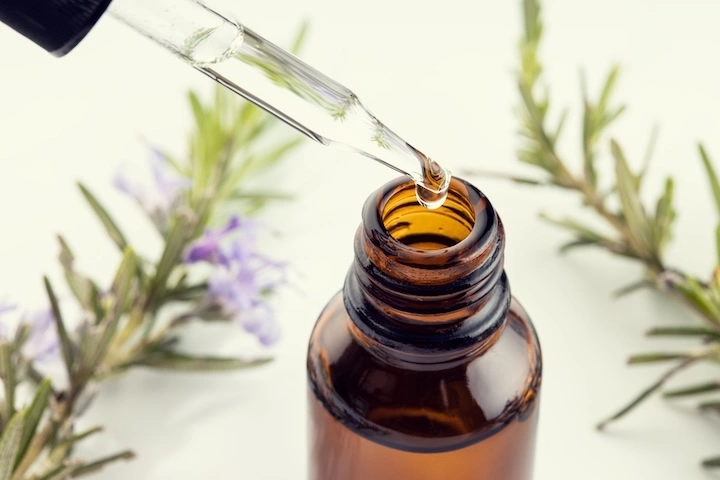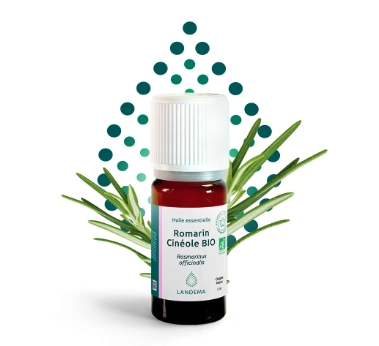
31 janvier 2025
Rosemary essential oil with 1,8-Cineole and Alzheimer's: answers to your questions
Alzheimer's disease represents a major public health challenge today, affecting nearly 7 million people in the United States alone, a number expected to double by 2050. Given the limitations of conventional treatments, research is increasingly turning toward complementary natural approaches.
The year 2024 marked a decisive turning point in Alzheimer's research. For the first time, clinical trials demonstrated that it was possible to slow the disease's progression by targeting its underlying causes. Simultaneously, new therapeutic avenues are emerging, particularly in the field of natural medicines.
In this promising context, a recent scientific study published in the journal Nutrients particularly stands out: "Rosmarinus officinalis and Mentha piperita oils supplementation enhances memory in a rat model of scopolamine-induced Alzheimer's disease-like condition" (see link at the end of the article). This research highlights the remarkable therapeutic potential of Rosemary essential oil with cineole (Rosmarinus officinalis), particularly when combined with Peppermint essential oil (Mentha x piperita).
In this article, we will analyze in detail the results of this study and its implications for people affected by Alzheimer's disease. We will specifically examine how these essential oils act on memory and cognitive functions, based on the latest scientific advances in this field.

Proven mechanisms of action: how Rosemary essential oil with cineole works on our brain?
Rosemary essential oil with cineole acts as a true protective shield for our brain. Here's how this remarkable essential oil works, explained simply:
Neuron protection
Our brain consists of billions of neurons that communicate with each other. In Alzheimer's disease, these neurons are progressively damaged. Rosemary essential oil with cineole intervenes by:
- Reducing oxidative stress that damages brain cells
- Decreasing brain inflammation
- Protecting neurons against degeneration
Action on brain communication
For our memory to function well, our neurons must communicate effectively using a chemical messenger called acetylcholine. In Alzheimer's disease, this messenger severely decreases. Rosemary essential oil with cineole helps to:
- Increase acetylcholine availability
- Improve message transmission between neurons
Stimulation of neuronal growth
Rosemary essential oil with cineole stimulates the production of a protein called BDNF, a true "fertilizer" for the brain that:
- Promotes the birth of new neurons
- Strengthens connections between existing neurons
- Improves brain plasticity, meaning the brain's ability to reorganize
Multi-level action
The effectiveness of Rosemary essential oil with cineole is explained by the presence of several active compounds:
- 1,8-cineole (between 35 and 55% of the essential oil) which improves memory
- Alpha-pinene (between 9 and 14%) which protects brain cells
- Camphor (between 5 and 15%) with anti-inflammatory properties
These mechanisms of action have been confirmed by recent scientific studies showing significant improvement in cognitive abilities among treated subjects.

Scientific results that give hope
Studies confirming effectiveness
A major discovery was recently published in the scientific journal Nutrients (see link at the end of the article): the combination of Rosemary essential oil with cineole (Rosmarinus officinalis) with Peppermint essential oil (Mentha x piperita) significantly improves memory.
This study demonstrates that:
- Spatial memory (ability to navigate) is improved
- Working memory (short-term memory) is strengthened
- Long-term memory is preserved
How Rosemary essential oil with cineole acts on our brain
Rosemary essential oil with cineole works in three complementary ways:
- It stimulates the production of acetylcholine, a chemical messenger essential for memory that decreases in people with Alzheimer's disease
- It protects neurons against stress and inflammation that damage the brain
- It promotes the birth of new neurons in the hippocampus, the brain area dedicated to memory
Even more promising results in synergy
The study reveals that the Rosemary with cineole-Peppermint essential oil combination is more effective than each essential oil used separately. This synergy is explained by the complementary action of their active compounds:
- 1,8-cineole from Rosemary with cineole essential oil (between 35 and 55%) improves memory
- Menthol (between 32 and 49%) and menthone (between 13 and 28%) from Peppermint essential oil enhance cognitive abilities
Encouraging prospects for patients
Another Japanese study conducted on Alzheimer's patients showed positive results after just one month of treatment combining Rosemary essential oil with cineole and Lemon (Citrus limon) in the morning, and True Lavender (Lavandula angustifolia) and Orange (Citrus sinensis) in the evening. Patients showed:
- Better orientation in time and space
- Decreased daytime drowsiness
- Overall improvement in cognitive functions
These discoveries open promising prospects for the natural treatment of Alzheimer's disease, although larger clinical studies are still needed to fully confirm these results.

Validated usage protocols
Atmospheric diffusion
The most effective method involves diffusing the essential oil according to this protocol:
- 2-3 drops of Rosemary essential oil with cineole in a diffuser
- 15-20 minute sessions
- Twice daily, morning and afternoon
Topical application
For more targeted action:
- 5% dilution in a carrier oil such as Jojoba (Simmondsia chinensis) or Macadamia (Macadamia integrifolia) oil
- Application on the nape and temples
- 2-3 daily applications
If choosing the Rosemary with cineole-Peppermint essential oil synergy, opt for a 50/50 ratio between the two essential oils.
Precautions for use
Target populations
This treatment is particularly indicated for:
- People over 60 for prevention purposes
- Patients in early stages of the disease
- People with mild cognitive impairment
Contraindications
Several precautions must be observed:
- Avoid during pregnancy
- Consult if epileptic
- Inform your treating physician

Therapeutic prospects and next steps
Rosemary essential oil with cineole, particularly when combined with Peppermint, opens promising perspectives for managing Alzheimer's disease. Here are the key steps ahead:
Clinical validation
The transition from preclinical studies to human trials requires several phases:
- Pilot studies on small patient groups to confirm safety
- Larger-scale randomized clinical trials
- Longitudinal studies to evaluate long-term effects
Protocol standardization
To ensure treatment effectiveness, it's necessary to establish:
- Optimal dosages according to disease stage
- Most effective administration methods
- Ideal treatment duration
Action mechanisms
Additional research is needed to:
- Deepen understanding of interactions between 1,8-cineole and neurotransmitters
- Study the impact on amyloid plaque formation
- Identify potential synergies with other molecules
Practical applications
The development of concrete therapeutic applications involves:
- Creating standardized formulations
- Establishing care protocols adapted to different stages of the disease
- Training healthcare professionals in these new approaches
Toward an integrative treatment
The future likely lies in a combined approach incorporating:
- Conventional treatments
- Targeted aromatherapy
- Lifestyle interventions
- Personalized monitoring
This holistic approach could offer a more comprehensive response to the challenges posed by Alzheimer's disease while improving patients' quality of life.

Discover our organic Rosemary essential oil with cineole
Exceptional quality for optimal results
Our Rosemary essential oil with cineole is carefully selected and distilled in Morocco using traditional methods to ensure optimal concentration of 1,8-cineole (between 38 and 55%) and essential active compounds for memory.
Why choose Landema.com's Rosemary essential oil with cineole?
- Origin: Organic Rosemary from Morocco, harvested at optimal maturity
- Quality: 100% pure and natural, without additives
- Traceability: from harvest to distillation
- Certification: Organic Agriculture
Our quality commitment
- Systematic chromatographic analyses
- Quality control for each batch
- Technical and regulatory documents provided with each order
Visit Landema's online store now to order your bottle. Containers from 5 ml for discovery up to 5 kg for professional use are available.
Frequently asked questions about Rosemary essential oil with cineole
What is the optimal duration of use?
To observe significant results, a minimum use of 4 to 6 weeks is recommended. Studies show progressive improvement in cognitive functions, with more pronounced effects after one month of regular use. However, the persistence of effects requires continuous use.
Is it more effective as prevention or once the disease has developed?
Rosemary essential oil with cineole shows particular effectiveness in prevention and early stages of the disease. Its action is optimal when used preventively, from the first signs of memory problems. In more advanced stages, it can still provide benefits, but its effectiveness will be more limited.
What is the best method of administration?
Atmospheric diffusion and direct inhalation are the most effective administration methods. The optimal protocol combines:
- Atmospheric diffusion: 2-3 drops morning and afternoon
- Direct inhalation: 1-2 deep breaths, 3 times daily
- Diluted topical application at 5% as a complement
Are there interactions with conventional drug treatments?
Studies show good compatibility with conventional Alzheimer's treatments. However, it is recommended to space out medication intake and essential oil use by at least 2 hours. Medical monitoring is advised for combined treatment.
At what age can preventive use begin?
Prevention can start from age 50, particularly in people with risk factors (family history, mild cognitive impairment). Preventive effectiveness is optimal when treatment is initiated before the first symptoms appear.
Do effects vary according to patient profile?
Effectiveness can vary according to several factors:
- Patient age
- Disease stage
- Regularity of use
- Combination with other essential oils like Peppermint
How can results be optimized?
To maximize benefits, it is recommended to:
- Combine with Peppermint for a synergistic effect
- Maintain regular use
- Associate with daily cognitive stimulation
- Follow a healthy lifestyle (balanced diet, regular physical activity)
Resource:
Items that could
interest
Our essential oils
will simplify your life
Your wishlist
You must be logged in to post a comment.
Login, or create an account
There is no comment for this article yet